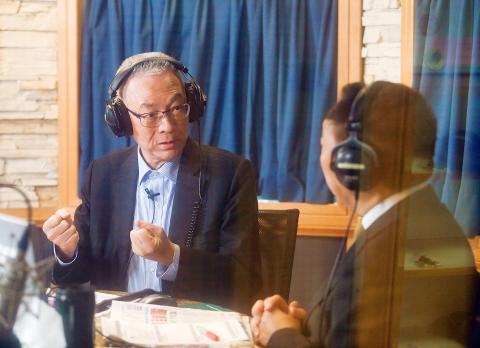Chinese Nationalist Party (KMT) Chairman Wu Den-yih (吳敦義) yesterday said that the KMT could sign a peace treaty with China if it returns to the Presidential Office after next year’s general elections.
Wu made the comments in an interview on morning radio show UFO Breakfast hosted by Tang Hsiang-lung (唐湘龍).
Earlier in the interview, Wu told Tang that the National Unification Guidelines, the implementation of which was suspended by former president Chen Shui-bian (陳水扁), could be reactivated by the KMT.

Photo: CNA
Tang then asked: “If the KMT is again the ruling party after next year’s elections, would and should it usher in a kind of final cross-strait peace treaty?”
“[Former minister of culture] Lung Ying-tai (龍應台) recently wrote that we have waited seven decades for an end to the war,” Tang said. “In a sense, the Chinese Civil War has not ended, because there has been no final peace treaty. Do you think that there should be such a peace treaty?”
Wu said that, according to the Act Governing Relations Between the People of the Taiwan Area and the Mainland Area (臺灣地區與大陸地區人民關係條例), only the government or its authorized institutions can negotiate agreements with China.
“If the KMT has the opportunity to rule again, then we would have met the conditions stipulated by the law,” Wu said.
“Assuming talks between the two sides are successful, a KMT government would be within its rights to sign a cross-strait peace treaty,” he said.
Asked if the party needs to change its cross-strait policy, Wu replied in the negative, saying that the KMT would not shift its position on the so-called “1992 consensus,” which he credited for “years of peace and stability” across the Taiwan Strait.
The “1992 consensus” — a term former Mainland Affairs Council chairman Su Chi (蘇起) in 2006 admitted making up in 2000 — refers to a tacit understanding between the KMT and the Chinese Communist Party that both sides acknowledge there is “one China,” with each side having its own interpretation of what “China” means.
Wu repeatedly refused to answer whether he plans to run for president next year, saying only that he has “a decision to make,” for which he did “not feel certain at present.”
Party unity, the chances of winning and fundraising are issues that he must consider before entertaining thoughts of a run for the presidency, he said.
The public would know his answer when registration for the KMT primary closes in May, Wu said, adding that he might decide not to run.
Separately yesterday, Democratic Progressive Party (DPP) spokesman Johnny Lin (林琮盛) said that “Wu’s so-called cross-strait peace treaty cannot guarantee peace; Taiwan’s sovereignty is the only foundation for building peace and stability.”
“The DPP stands fast in the defense of the sovereign independence of the Republic of China, Taiwan and the values of freedom, democracy and human rights,” he said.
Additional reporting by Su Fun-her

CHAOS: Iranians took to the streets playing celebratory music after reports of Khamenei’s death on Saturday, while mourners also gathered in Tehran yesterday Iranian Supreme Leader Ayatollah Ali Khamenei was killed in a major attack on Iran launched by Israel and the US, throwing the future of the Islamic republic into doubt and raising the risk of regional instability. Iranian state television and the state-run IRNA news agency announced the 86-year-old’s death early yesterday. US President Donald Trump said it gave Iranians their “greatest chance” to “take back” their country. The announcements came after a joint US and Israeli aerial bombardment that targeted Iranian military and governmental sites. Trump said the “heavy and pinpoint bombing” would continue through the week or as long

TRUST: The KMT said it respected the US’ timing and considerations, and hoped it would continue to honor its commitments to helping Taiwan bolster its defenses and deterrence US President Donald Trump is delaying a multibillion-dollar arms sale to Taiwan to ensure his visit to Beijing is successful, a New York Times report said. The weapons sales package has stalled in the US Department of State, the report said, citing US officials it did not identify. The White House has told agencies not to push forward ahead of Trump’s meeting with Chinese President Xi Jinping (習近平), it said. The two last month held a phone call to discuss trade and geopolitical flashpoints ahead of the summit. Xi raised the Taiwan issue and urged the US to handle arms sales to

BIG SPENDERS: Foreign investors bought the most Taiwan equities since 2005, signaling confidence that an AI boom would continue to benefit chipmakers Taiwan Semiconductor Manufacturing Co’s (TSMC, 台積電) market capitalization swelled to US$2 trillion for the first time following a 4.25 percent rally in its American depositary receipts (ADR) overnight, putting the world’s biggest contract chipmaker sixth on the list of the world’s biggest companies by market capitalization, just behind Amazon.com Inc. The site CompaniesMarketcap.com ranked TSMC ahead of Saudi Aramco and Meta Platforms Inc. The Taiwanese company’s ADRs on Tuesday surged to US$385.75 on the New York Stock Exchange, as strong demand for artificial intelligence (AI) applications led to chip supply constraints and boost revenue growth to record-breaking levels. Each TSMC ADR represents

State-run CPC Corp, Taiwan (CPC, 台灣中油) yesterday said that it had confirmed on Saturday night with its liquefied natural gas (LNG) and crude oil suppliers that shipments are proceeding as scheduled and that domestic supplies remain unaffected. The CPC yesterday announced the gasoline and diesel prices will rise by NT$0.2 and NT$0.4 per liter, respectively, starting Monday, citing Middle East tensions and blizzards in the eastern United States. CPC also iterated it has been reducing the proportion of crude oil imports from the Middle East and diversifying its supply sources in the past few years in response to geopolitical risks, expanding